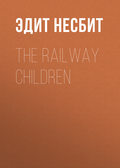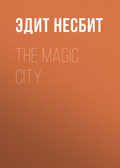
Эдит Несбит
Man and Maid
X
THE HOUSE OF SILENCE
The thief stood close under the high wall, and looked to right and left. To the right the road wound white and sinuous, lying like a twisted ribbon over the broad grey shoulder of the hill; to the left the road turned sharply down towards the river; beyond the ford the road went away slowly in a curve, prolonged for miles through the green marshes.
No least black fly of a figure stirred on it. There were no travellers at such an hour on such a road.
The thief looked across the valley, at the top of the mountain flushed with sunset, and at the grey-green of the olives about its base. The terraces of olives were already dusk with twilight, but his keen eyes could not have missed the smallest variance or shifting of their lights and shadows. Nothing stirred there. He was alone.
Then, turning, he looked again at the wall behind him. The face of it was grey and sombre, but all along the top of it, in the crannies of the coping stones, orange wallflowers and sulphur-coloured snapdragons shone among the haze of feathery-flowered grasses. He looked again at the place where some of the stones had fallen from the coping – had fallen within the wall, for none lay in the road without. The bough of a mighty tree covered the gap with its green mantle from the eyes of any chance wayfarer; but the thief was no chance wayfarer, and he had surprised the only infidelity of the great wall to its trust.
To the chance wayfarer, too, the wall’s denial had seemed absolute, unanswerable. Its solid stone, close knit by mortar hardly less solid, showed not only a defence, it offered a defiance – a menace. But the thief had learnt his trade; he saw that the mortar might be loosened a little here, broken a little there, and now the crumbs of it fell rustling on to the dry, dusty grass of the roadside. He drew back, took two quick steps forward, and, with a spring, sudden and agile as a cat’s, grasped the wall where the gap showed, and drew himself up. Then he rubbed his hands on his knees, because his hands were bloody from the sudden grasping of the rough stones, and sat astride on the wall.
He parted the leafy boughs and looked down; below him lay the stones that had fallen from the wall – already grass was growing upon the mound they made. As he ventured his head beyond the green leafage, the level light of the sinking sun struck him in the eyes. It was like a blow. He dropped softly from the wall and stood in the shadow of the tree – looking, listening.
Before him stretched the park – wide and still; dotted here and there with trees, and overlaid with gold poured from the west. He held his breath and listened. There was no wind to stir the leaves to those rustlings which may deceive and disconcert the keenest and the boldest; only the sleepy twitter of birds, and the little sudden soft movements of them in the dusky privacy of the thick-leaved branches. There was in all the broad park no sign of any other living thing.
The thief trod softly along under the wall where the trees were thickest, and at every step he paused to look and listen.
It was quite suddenly that he came upon the little lodge near the great gates of wrought iron with the marble gate-posts bearing upon them the two gaunt griffins, the cognisance of the noble house whose lands these were. The thief drew back into the shadow and stood still, only his heart beat thickly. He stood still as the tree trunk beside him, looking, listening. He told himself that he heard nothing – saw nothing – yet he became aware of things. That the door of the lodge was not closed, that some of its windows were broken, and that into its little garden straw and litter had drifted from the open door: and that between the stone step and the threshold grass was growing inches high. When he was aware of this he stepped forward and entered the lodge. All the sordid sadness of a little deserted home met him here – broken crocks and bent pans, straw, old rags, and a brooding, dusty stillness.
“There has been no one here since the old keeper died. They told the truth,” said the thief; and he made haste to leave the lodge, for there was nothing in it now that any man need covet – only desolation and the memory of death.
So he went slowly among the trees, and by devious ways drew a little nearer to the great house that stood in its walled garden in the middle of the park. From very far off, above the green wave of trees that broke round it, he could see the towers of it rising black against the sunset; and between the trees came glimpses of its marble white where the faint grey light touched it from the east.
Moving slowly – vigilant, alert, with eyes turning always to right and to left, with ears which felt the intense silence more acutely than they could have felt any tumult – the thief reached the low wall of the garden, at the western side. The last redness of the sunset’s reflection had lighted all the many windows, and the vast place blazed at him for an instant before the light dipped behind the black bar of the trees, and left him face to face with a pale house, whose windows now were black and hollow, and seemed like eyes that watched him. Every window was closed; the lower ones were guarded by jalousies; through the glass of the ones above he could see the set painted faces of the shutters.
From far off he had heard, and known, the plash-plash of fountains, and now he saw their white changing columns rise and fall against the background of the terrace. The garden was full of rose bushes trailing and unpruned; and the heavy, happy scent of the roses, still warm from the sun, breathed through the place, exaggerating the sadness of its tangled desolation. Strange figures gleamed in the deepening dusk, but they were too white to be feared. He crept into a corner where Psyche drooped in marble, and, behind her pedestal, crouched. He took food from his pockets and ate and drank. And between the mouthfuls he listened and watched.
The moon rose, and struck a pale fire from the face of the house and from the marble limbs of the statues, and the gleaming water of the fountains drew the moonbeams into the unchanging change of its rise and fall.
Something rustled and stirred among the roses. The thief grew rigid: his heart seemed suddenly hollow; he held his breath. Through the deepening shadows something gleamed white; and not marble, for it moved, it came towards him. Then the silence of the night was shattered by a scream, as the white shape glided into the moonlight. The thief resumed his munching, and another shape glimmered after the first. “Curse the beasts!” he said, and took another draught from his bottle, as the white peacocks were blotted out by the shadows of the trees, and the stillness of the night grew more intense.
In the moonlight the thief went round and about the house, pushing through the trailing briers that clung to him – and now grown bolder he looked closely at doors and windows. But all were fast barred as the doors of a tomb. And the silence deepened as the moonlight waxed.
There was one little window, high up, that showed no shutter. He looked at it; measured its distance from the ground and from the nearest of the great chestnut trees. Then he walked along under the avenue of chestnuts with head thrown back and eyes fixed on the mystery of their interlacing branches.
At the fifth tree he stopped; leaped to the lowest bough, missed it; leaped again, caught it, and drew up his body. Then climbing, creeping, swinging, while the leaves, agitated by his progress, rustled to the bending of the boughs, he passed to that tree, to the next – swift, assured, unhesitating. And so from tree to tree, till he was at the last tree – and on the bough that stretched to touch the little window with its leaves.
He swung from this. The bough bent and cracked, and would have broken, but that at the only possible instant the thief swung forward, felt the edge of the window with his feet, loosed the bough, sprang, and stood, flattened against the mouldings, clutching the carved drip-stone with his hands. He thrust his knee through the window, waiting for the tinkle of the falling glass to settle into quietness, opened the window, and crept in. He found himself in a corridor: he could see the long line of its white windows, and the bars of moonlight falling across the inlaid wood of its floor.
He took out his thief’s lantern – high and slender like a tall cup – lighted it, and crept softly along the corridor, listening between his steps till the silence grew to be like a humming in his ears.
And slowly, stealthily, he opened door after door; the rooms were spacious and empty – his lantern’s yellow light flashing into their corners told him this. Some poor, plain furniture he discerned, a curtain or a bench here and there, but not what he sought. So large was the house, that presently it seemed to the thief that for many hours he had been wandering along its galleries, creeping down its wide stairs, opening the grudging doors of the dark, empty rooms, whose silence spoke ever more insistently in his ears.
“But it is as he told me,” he said inwardly: “no living soul in all the place. The old man – a servant of this great house – he told me; he knew, and I have found all even as he said.”
Then the thief turned away from the arched emptiness of the grand staircase, and in a far corner of the hall he found himself speaking in a whisper because now it seemed to him that nothing would serve but that this clamorous silence should be stilled by a human voice.
“The old man said it would be thus – all emptiness, and not profit to a man; and he died, and I tended him. Dear Jesus! how our good deeds come home to us! And he told me how the last of the great family had gone away none knew whither. And the tales I heard in the town – how the great man had not gone, but lived here in hiding – It is not possible. There is the silence of death in this house.”
He moistened his lips with his tongue. The stillness of the place seemed to press upon him like a solid thing. “It is like a dead man on one’s shoulders,” thought the thief, and he straightened himself up and whispered again: “The old man said, ‘The door with the carved griffin, and the roses enwreathed, and the seventh rose holds the secret in its heart.’”
With that the thief set forth again, creeping softly across the bars of moonlight down the corridor.
And after much seeking he found at last, under the angle of the great stone staircase behind a mouldering tapestry wrought with peacocks and pines, a door, and on it carved a griffin, wreathed about with roses. He pressed his finger into the deep heart of each carven rose, and when he pressed the rose that was seventh in number from the griffin, he felt the inmost part of it move beneath his finger as though it sought to escape. So he pressed more strongly, leaning against the door till it swung open, and he passed through it, looking behind him to see that nothing followed. The door he closed as he entered.
And now he was, as it seemed, in some other house. The chambers were large and lofty as those whose hushed emptiness he had explored – but these rooms seemed warm with life, yet held no threat, no terror. To the dim yellow flicker from the lantern came out of the darkness hints of a crowded magnificence, a lavish profusion of beautiful objects such as he had never in his life dreamed of, though all that life had been one dream of the lovely treasures which rich men hoard, and which, by the thief’s skill and craft, may come to be his.
He passed through the rooms, turning the light of his lantern this way and that, and ever the darkness withheld more than the light revealed. He knew that thick tapestries hung from the walls, velvet curtains masked the windows; his hand, exploring eagerly, felt the rich carving of chairs and presses; the great beds were hung with silken cloth wrought in gold thread with glimmering strange starry devices. Broad sideboards flashed back to his lantern’s questionings the faint white laugh of silver; the tall cabinets could not, with all their reserve, suppress the confession of wrought gold, and, from the caskets into whose depths he flashed the light, came the trembling avowal of rich jewels. And now, at last, that carved door closed between him and the poignant silence of the deserted corridors, the thief felt a sudden gaiety of heart, a sense of escape, of security. He was alone, yet warmed and companioned. The silence here was no longer a horror, but a consoler, a friend.
And, indeed, now he was not alone. The ample splendours about him, the spoils which long centuries had yielded to the grasp of a noble family – these were companions after his own heart.
He flung open the shade of his lantern and held it high above his head. The room still kept half its secrets. The discretion of the darkness should be broken down. He must see more of this splendour – not in unsatisfying dim detail, but in the lit gorgeous mass of it. The narrow bar of the lantern’s light chafed him. He sprang on to the dining-table, and began to light the half-burnt chandelier. There were a hundred candles, and he lighted all, so that the chandelier swung like a vast living jewel in the centre of the hall. Then, as he turned, all the colour in the room leapt out at him. The purple of the couches, the green gleam of the delicate glass, the blue of the tapestries, and the vivid scarlet of the velvet hangings, and with the colour sprang the gleams of white from the silver, of yellow from the gold, of many-coloured fire from strange inlaid work and jewelled caskets, till the thief stood aghast with rapture in the strange, sudden revelation of this concentrated splendour.
He went along the walls with a lighted candle in his hand – the wax dripped warm over his fingers as he went – lighting one after another, the tapers in the sconces of the silver-framed glasses. In the state bedchamber he drew back suddenly, face to face with a death-white countenance in which black eyes blazed at him with triumph and delight. Then he laughed aloud. He had not known his own face in the strange depths of this mirror. It had no sconces like the others, or he would have known it for what it was. It was framed in Venice glass – wonderful, gleaming, iridescent.
The thief dropped the candle and threw his arms wide with a gesture of supreme longing.
“If I could carry it all away! All, all! Every beautiful thing! To sell some – the less beautiful, and to live with the others all my days!”
And now a madness came over the thief. So little a part of all these things could he bear away with him; yet all were his – his for the taking – even the huge carved presses and the enormous vases of solid silver, too heavy for him to lift – even these were his: had he not found them – he, by his own skill and cunning? He went about in the rooms, touching one after the other the beautiful, rare things. He caressed the gold and the jewels. He threw his arms round the great silver vases; he wound round himself the heavy red velvet of the curtain where the griffins gleamed in embossed gold, and shivered with pleasure at the soft clinging of its embrace. He found, in a tall cupboard, curiously-shaped flasks of wine, such wine as he had never tasted, and he drank of it slowly – in little sips – from a silver goblet and from a green Venice glass, and from a cup of rare pink china, knowing that any one of his drinking vessels was worth enough to keep him in idleness for a long year. For the thief had learnt his trade, and it is a part of a thief’s trade to know the value of things.
He threw himself on the rich couches, sat in the stately carved chairs, leaned his elbows on the ebony tables. He buried his hot face in the chill, smooth linen of the great bed, and wondered to find it still scented delicately as though some sweet woman had lain there but last night. He went hither and thither laughing with pure pleasure, and making to himself an unbridled carnival of the joys of possession.
In this wise the night wore on, and with the night his madness wore away. So presently he went about among the treasures – no more with the eyes of a lover, but with the eyes of a Jew – and he chose those precious stones which he knew for the most precious, and put them in the bag he had brought, and with them some fine-wrought goldsmith’s work and the goblet out of which he had drunk the wine. Though it was but of silver, he would not leave it. The green Venice glass he broke and the cup, for he said: “No man less fortunate than I, to-night, shall ever again drink from them.” But he harmed nothing else of all the beautiful things, because he loved them.
Then, leaving the low, uneven ends of the candles still alight, he turned to the door by which he had come in. There were two doors, side by side, carved with straight lilies, and between them a panel wrought with the griffin and the seven roses enwreathed. He pressed his finger in the heart of the seventh rose, hardly hoping that the panel would move, and indeed it did not; and he was about to seek for a secret spring among the lilies, when he perceived that one of the doors wrought with these had opened itself a little. So he passed through it and closed it after him.
“I must guard my treasures,” he said. But when he had passed through the door and closed it, and put out his hand to raise the tattered tapestry that covered it from without, his hand met the empty air, and he knew that he had not come out by the door through which he had entered.
When the lantern was lighted, it showed him a vaulted passage, whose floor and whose walls were stone, and there was a damp air and a mouldering scent in it, as of a cellar long unopened. He was cold now, and the room with the wine and the treasures seemed long ago and far away, though but a door and a moment divided him from it, and though some of the wine was in his body, and some of the treasure in his hands. He set about to find the way to the quiet night outside, for this seemed to him a haven and a safeguard since, with the closing of that door, he had shut away warmth, and light, and companionship. He was enclosed in walls once more, and once more menaced by the invading silence that was almost a presence. Once more it seemed to him that he must creep softly, must hold his breath before he ventured to turn a corner – for always he felt that he was not alone, that near him was something, and that its breath, too, was held.
So he went by many passages and stairways, and could find no way out; and after a long time of searching he crept by another way back to come unawares on the door which shut him off from the room where the many lights were, and the wine and the treasure. Then terror leaped out upon him from the dark hush of the place, and he beat on the door with his hands and cried aloud, till the echo of his cry in the groined roof cowed him back into silence.
Again he crept stealthily by strange passages, and again could find no way except, after much wandering, back to the door where he had begun.
And now the fear of death beat in his brain with blows like a hammer. To die here like a rat in a trap, never to see the sun alight again, never to climb in at a window, or see brave jewels shine under his lantern, but to wander, and wander, and wander between these inexorable walls till he died, and the rats, admitting him to their brotherhood, swarmed round the dead body of him.
“I had better have been born a fool,” said the thief.
Then once more he went through the damp and the blackness of the vaulted passages, tremulously searching for some outlet, but in vain.
Only at last, in a corner behind a pillar, he found a very little door and a stair that led down. So he followed it, to wander among other corridors and cellars, with the silence heavy about him, and despair growing thick and cold like a fungus about his heart, and in his brain the fear of death beating like a hammer.
It was quite suddenly in his wanderings, which had grown into an aimless frenzy, having now less of search in it than of flight from the insistent silence, that he saw at last a light – and it was the light of day coming through an open door. He stood at the door and breathed the air of the morning. The sun had risen and touched the tops of the towers of the house with white radiance; the birds were singing loudly. It was morning, then, and he was a free man.
He looked about him for a way to come at the park, and thence to the broken wall and the white road, which he had come by a very long time before. For this door opened on an inner enclosed courtyard, still in damp shadow, though the sun above struck level across it – a courtyard where tall weeds grew thick and dank. The dew of the night was heavy on them.
As he stood and looked, he was aware of a low, buzzing sound that came from the other side of the courtyard. He pushed through the weeds towards it; and the sense of a presence in the silence came upon him more than ever it had done in the darkened house, though now it was day, and the birds sang all gaily, and the good sun shone so bravely overhead.
As he thrust aside the weeds which grew waist-high, he trod on something that seemed to writhe under his feet like a snake. He started back and looked down. It was the long, firm, heavy plait of a woman’s hair. And just beyond lay the green gown of a woman, and a woman’s hands, and her golden head, and her eyes; all about the place where she lay was the thick buzzing of flies, and the black swarming of them.
The thief saw, and he turned and he fled back to his doorway, and down the steps and through the maze of vaulted passages – fled in the dark, and empty-handed, because when he had come into the presence that informed that house with silence, he had dropped lantern and treasure, and fled wildly, the horror in his soul driving him before it. Now fear is more wise than cunning, so, whereas he had sought for hours with his lantern and with all his thief’s craft to find the way out, and had sought in vain, he now, in the dark and blindly, without thought or will, without pause or let, found the one way that led to a door, shot back the bolts, and fled through the awakened rose garden and across the dewy park.
He dropped from the wall into the road, and stood there looking eagerly to right and left. To the right the road wound white and sinuous, like a twisted ribbon over the great, grey shoulder of the hill; to the left the road curved down towards the river. No least black fly of a figure stirred on it. There are no travellers on such a road at such an hour.







